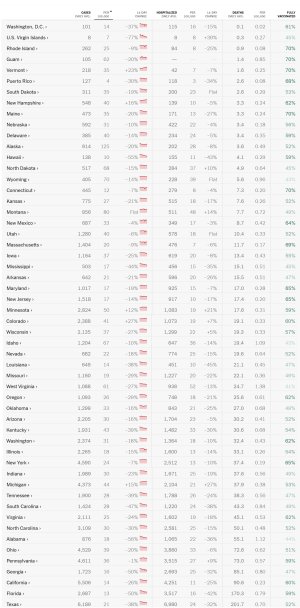FiftySeven
Community Member
- MBTI
- infj
- Enneagram
- ?
https://healthfeedback.org/claimrev...t-covid-19-vaccines-weaken-the-immune-system/
No evidence showing that COVID-19 vaccination weakens the immune system
Cole claimed that the COVID-19 vaccines weakened a person’s immune system, thereby making them more prone to cancer and infectious diseases. He alleged that this was due to the vaccines’ effect on CD8 T cells and cited a “study out of Germany” that examined this subject in “young individuals after the Pfizer” vaccine. CD8+ T cells are a subset of immune cells known as lymphocytes. As explained by the British Society for Immunology, they play a major role in the defense against viruses and bacteria as well as cancer.
Health Feedback reached out to Cole to request the reference for this study, but didn’t receive a response by the time of this review’s publication. We will update this review if new information is available.
This article, published by the website UK Column and authored by a “Dr. Mike Williams”, associated the claim with studies published by researchers in the U.S. and the Netherlands. UK Column is described by Media Bias/Fact Check as a Conspiracy-Pseudoscience source. Williams, who is listed as a writer for UK Column, is described as “a medical consultant, operating in private practice”. No credentials for Williams are listed that indicate expertise in infectious diseases, vaccines, or immunology.
One of these studies was co-authored by Katalin Karikó and colleagues[1]. Karikó is recognized as one of the pioneers who made RNA vaccines a reality. The story of the development of RNA vaccines is a long and complex one, which was chronicled in a news article by Nature.
Karikó’s study, published in the journal Immunity in 2005, reported that modifying RNA in certain ways avoided the triggering of Toll-like receptors (TLRs). These receptors are part of the immune system’s repertoire of pathogen sensors. They recognize specific features common to specific groups of disease-causing microorganisms—like DNA and RNA—thus alerting the immune system to the presence of pathogens and priming the immune system to fight back.

Figure 1. Various TLR receptors and the microbial components that each receptor detects. From Medzhitov (2001) Nature Reviews Immunology[2].
The study by Karikó et al. provided a key finding for overcoming obstacles in developing RNA-based technologies to be used in vaccines and medical treatments. This 10 November 2020 STAT News article explained the potential of RNA technology and the barriers towards its deployment:
“In the natural world, the body relies on millions of tiny proteins to keep itself alive and healthy, and it uses mRNA to tell cells which proteins to make. If you could design your own mRNA, you could, in theory, hijack that process and create any protein you might desire — antibodies to vaccinate against infection, enzymes to reverse a rare disease, or growth agents to mend damaged heart tissue […]
The problem, [Karikó] knew, was that synthetic RNA was notoriously vulnerable to the body’s natural defenses, meaning it would likely be destroyed before reaching its target cells. And, worse, the resulting biological havoc might stir up an immune response that could make the therapy a health risk for some patients.”
The UK Column article claimed that the study used RNA modifications to “turn off [T]oll-like receptors”. But no such thing is described in the study by Karikó et al. The modifications and their effects are associated with the modified RNA only, and don’t change the ability of TLRs to detect other microbial components.
To use an analogy, modifying RNA is like putting on camouflage to evade detection by sentries guarding a border. But those sentries remain capable of detecting other intruders that don’t have the camouflage.
Furthermore, as Karikó et al. noted, the modifications used in the study are also observed in nature, and mammalian RNA is naturally replete with such modifications. If the article’s claim that such modifications weaken the immune system were true to begin with, then such pre-existing modifications alone would be enough to weaken the immune system even without the COVID-19 vaccines.
In short, the article misrepresented the study’s findings and is inconsistent with real-world observations.
The UK Column article then went on to cite a preprint (a study that hasn’t been peer-reviewed by other scientists yet) authored by researchers in the Netherlands[3]. That study isolated immune cells from the blood of vaccinated people and studied how the cells responded to different kinds of stimuli.
The study reported that certain chemicals produced by the immune system, known as cytokines, were lower in cells from vaccinated people when stimulated with certain pathogens, but higher for other pathogens. The authors concluded that “These results collectively demonstrate that the effects of the [Pfizer-BioNTech] vaccine go beyond the adaptive immune system and can also modulate innate immune responses”.
The authors also discussed various implications of their findings, which were more open-ended than the UK Column article led readers to believe. One such implication is this:
“The induction of tolerance towards stimulation with TLR7/8 (R848) or TLR4 (LPS) ligands by [the Pfizer-BioNTech vaccine] may indicate a more balanced inflammatory reaction during infection with SARS-CoV-2, and one could speculate whether such effect may be thus useful to regulate the potential over-inflammation in COVID-19, one of the main causes of death.”
While the preprint’s results are interesting and researchers are following up on this subject, the authors also cautioned that the study included only a small number of people and weren’t generalizable to everyone.
The authors concluded:
“Intriguingly, the [Pfizer-BioNTech] vaccine induces reprogramming of innate immune responses as well, and this needs to be taken into account: in combination with strong adaptive immune responses, this could contribute to a more balanced inflammatory reaction during COVID-19 infection, or it may contribute to a diminished innate immune response towards the virus […] Our findings need to be confirmed by conducting larger cohort-studies with populations with diverse backgrounds, while further studies should examine the potential interactions between [the Pfizer-BioNTech vaccine] and other vaccines.”
Overall, the two studies cited by UK Column don’t support the article’s suggestion that COVID-19 vaccination weakens the immune system and makes one more prone to cancer and infectious diseases.








